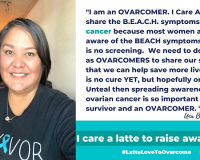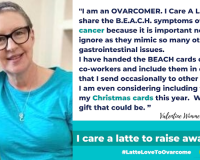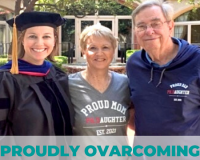Cancer is not just a diagnosis, it is a life changing experience that requires preparation, planning, courage, emotional strength and the conviction to Ovarcome. Ovarcome’s Founder Runsi Sen sat down with Oncology Nurse Navigator Sylvia Brown to discuss preparing for treatment, managing side effects, and balancing everyday life with an ovarian cancer diagnosis. Please share with anyone that might benefit from this information, and keep on TALKING ABOUT OVARIAN CANCER. TOGETHER, we can #Ovarcome!
Sylvia L. Brown, MS, RN, OCN, CNL, ONN-CG
Oncology Nurse Navigator
Memorial Hermann Cancer Center – Texas Medical Center
Sylvia is an Oncology Nurse Navigator at the Memorial Hermann Cancer Center in the Texas Medical Center. She earned her Bachelor of Science in Nursing degree at The University of Texas School of Nursing in Houston. She continued with her Master of Science degree at Texas Woman’s University in Houston. Sylvia is a certified Clinical Nurse Leader, Oncology Certified Nurse, and is a certified Oncology Nurse Navigator.
Sylvia has authored articles that have appeared in such publications as Oncology Nursing Forum and The Nursing Student’s Guide to Clinical Success. She has been a collaborator in several research studies, such as assessing the effects of exercise during the stem cell transplantation process, which resulted in publication. Sylvia has also participated in multiple quality improvement initiatives, resulting in poster presentations at conferences on a national level.
Sylvia, a melanoma survivor herself, shares her inspiration and strength to Ovarcome:
- Tell us the life lesson you have learned from being an oncology nurse navigator?
- Take each day as it comes. Worrying about what will happen in months to come will create more stress and unnecessary worry. Cherish the little things. I worry less and appreciate life more. My family always gives me a hard time saying I don’t have sympathy for them when they are sick with a cold, (haha), but I see life threatening illness each and every day, so I worry less about the small things and appreciate each and every day.
- For someone recently diagnosed with ovarian cancer, what advice would you give in terms of preparing for treatment?
- Try to relax as much as possible. Being somewhat anxious is normal, but if you are overly anxious, seek assistance in relaxation prior to starting treatment.
- Make sure you are aware of your treatment plan, possible side effects of the treatment, and how to manage those side effects. Your health care team will be able to assist with this.
- For someone experiencing side effects from treatment, please share your recommendations on managing side effects?
- This is dependent on the treatment a patient receives. In general, as stated before, be aware of the possible side effects. Ask ahead of time how best to manage them. Contact your medical professional for any side effect that is prolonged and not managed with the medications provided.
- Fatigue is reported by most patients. It is important to allow yourself rest/naps, but to also stay active. Take small/short walks. Try to rest well at night, avoid caffeine prior to bed time will help. Conserve energy, prioritize daily activities. Don’t push yourself. Good nutrition and stress reduction assist in fatigue management as well. If a patient experiences fatigue, talk to your health care team about it.
- What advice would you give to someone diagnosed with ovarian cancer in terms of balancing care with demands of a normal life?
- This can be a challenge for many. Change is difficult and getting into a routine with the “new normal” can be challenging. This is the time to let others help. Many patients tell me they gave always been independent, helping others, but have a hard time asking for help. This is the time to ask. Maybe allowing someone to bring a meal once a week or going to the grocery store for you. Anything that someone can do that will allow you to take care of you. Allow yourself time to adjust, be patient, listen to your body, don’t overdo it, but try not to create a sedentary lifestyle.
- What would be your best advice to women that have finished treatment and are ready for the next chapter in their lives?
- This is a very big transition for most. Patients are so happy to complete treatment, but feel a sense of loss when treatment is over. Many explain that they feel the “security” is gone and they are on their own. Also, ,many fear the cancer may return. It is important to seek support during this transition. There are many programs and support groups in the community that address these issues. You are not alone, there are many survivors who have gone through exactly what you are going through and can assist with support as well. Most find comfort and relief in talking with other survivors and sharing stories.
- There are many resources addressing Survivorship issues on the internet. Google and you will find many!






